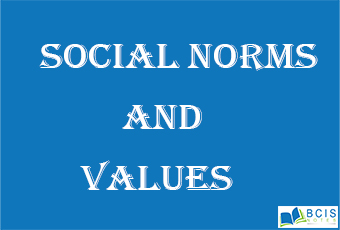
Social Norms and Values
Social Norms and Values are the basic topics in the foundations of society. Norms are cultural standards comprising way of thinking, doing, perceiving with group-shared expectations. It is learned and transmitted a rough socialization process that helps to be a member of society and to cherish the social goal. They are abstract conformity which is obeyed by members of society. Violation of its is often called deviance. They provide the ultimate meaning and legitimacy for social arrangements and social behavior.
Norms
- In the literal meaning, the word ‘ Norm’ is derived from the Latin word ‘Norma’, which means method, rule, and measurement.
- Norm is standard or rules, regulating the behavior of social settings.
- Social norms “refer to the group – shared standards of behavior.
- Norms represent “standardized generalizations” concerning expected modes of behavior.
Robert Bierstadt contemplates, “A norm is a rule or standard that governs our conduct in the social situations in which we participate.” Each organization has its own norms and values to achieve the goal where we participate in social activities.
Major Types of Norms
- Private Norms
- Group Norms
- Associational Norms
- National Norms
Private Norms:
An individual can have his own norms as an independent citizen. Each family can have its own norms according to its nature mediated through caste, class, ethnicity, religion and geographical location.
Group Norms:
There can be different groups in society. Each group develops its own norms in order to meet its requirements. They are the blueprint of working procedures that guides to carry out their requirements. A literary group can have its own norms to create literature and to disseminate it to the readers and listeners. Games and sports groups, religious groups, social workgroups.
3. Associational Norms:
In order to cherish the goal of the organization, it can develop its own certain sets of norms and values which help themselves for smooth functioning. Many associations develop their own autonomous rules and regulations for their own convenience and achieve goals.
4. National Norms
Macro-level prescription prescribed by the state. An independent and sovereign state has its own original norms and generation through curricula, religious institutions, national broadcasting agencies. It helps to shape the personality of citizens in a unified way.
Characteristics of Social Norms
- Social Norms are Cultural Standards
- Norms help in Controlling Human Behavior and Actions
- Norms are Unwritten Oral Practices
- Norms help to maintain Social Order, Deviant Behavioral Practices and Juvenile Delinquency
- Social Norms are dynamic and Universal
- Norms differ from Society to Society
- Norms help to enrich Human Civilization and Maintain Social Solidarity
- Violating the Norms can be Cultural Anomie
- Norms give Cohesion to Society
- Norms influence Individual’s Attitudes
Values
Social Values are universal cultural standards that advocate what is good and bad, right and wrong and desirable and undesirable. Social values can evaluate the social norms of subjectively and objectively.
- Social value is not as a value of commodity but it is the measurement of social behavior and human activities.
- It is the criteria to differentiate what should be done or what should not be done.
- The nature of social value is different according to society and culture.
Types of Social Values
The main types of social values are explained as follows:
1. General Social Values
General Social Values: They are the higher standard cultural values. They are universally accepted human values. Democracy, fundamental human rights, social equality, justice, women empowerment, cultural recognition, and distribution are some examples of universal social values. They are globally accepted cultural standards expected to follow by all the nations who are the UN members through pout the world.
2. Specific Social Values:
Specific social values are followed in a specific society. Muslim society has its own values towards marriage, food Items, wearing costumes, etc. Nepalese society has its own specific values rooted in culture. It differs from society to society and state to state.
Characteristics of Social Values
- Social Values are Universal Cultural Standards
- They advocate for Truth, Realities and for Universal Ideas
- There can be Explicit and Implicit Social Values
- Social Values are Dynamic
- It speaks what is Right and Wrong
- It helps to Enrich Human Civilization
- Values are Hierarchy Arranged
You may also like Culture

Leave a Reply